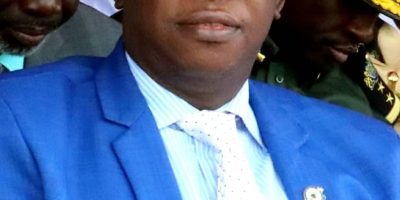By Madi Jobarteh
Almost six years ago the National Assembly passed the Anti-Corruption Commission Act which was assented to by Pres. Yaya Jammeh on 17th August 2012 to become a law in the Gambia. The law was meant to establish a body to fight corruption by public officers in the Gambia. Yet since the law was created Yaya Jammeh refused to establish this body, rather he would be continuously singing about corruption while failing to do what should have been done to fight corruption.

Madi Jobarteh
Photo Credit: Madi Jobarteh
Since taking office on 19 January 2017, Pres. Adama Barrow also continues to sing about corruption yet he has not established the Anti-Corruption Commission when the law is already in place. What is he waiting for? If indeed Barrow is interested in the fight against corruption as he claims why is he still waiting to set up this body, 12 months after taking office? Or is he also dancing to the gallery just like Yaya Jammeh just to give the impression that he is against corruption?
Anyone interested in helping Barrow must therefore advise him to set up this body urgently because it is only when citizens and the international community see that an anti-corruption body is up and running independently that they will have confidence that indeed a new dispensation has unfolded in the Gambia! That way Barrow will also raise his profile and credibility and strengthen his leadership to the highest level. It is not enough for a president to openly condemn corruption when in reality that president fails to set up the necessary mechanisms to tackle corruption. Words must be put into practice otherwise they become mere lip service.
The Anti-Corruption Commission Act was meant to prohibit and prescribe punishment for corruption. Section 5 of the Act spells out its functions which among others include developing and promoting standards of best practices in integrity and anti-corruption for public officers. The Commission is also mandated to develop and enforce a code of ethics for public officers. It has powers to take action against any public officer alleged to have engaged in unethical conduct. The Commission is to also raise public awareness about corruption so as to generate public support in the fight against corruption. It also has a mandate to monitor the practices and procedures of public institutions in order to detect corruption and to take legal action against such misconduct including the recovery and protection of public property.
From the foregoing it is clear that the Gambia needs such a state institution given the rumours of corruption circulating all over the country. The mere fact that public service delivery is poor, erratic and expensive in themselves reflect the incidence of corruption. The poor and limited utility supply or the failure of cleansing services or the condition of our roads, not to mention the poor state of public health facilities and schools as well as the failure of Gambian football – all indicate the incidence of corruption in the public service.
Over the past few days, Gambians have heard the Minister of Health speak about corruption in the health sector. We have also heard former public officers from NAWEC and GIEPA speak about corruption concerning various contracts. We also know that a Senegalese businessman had donated properties to Barrow in his first official visit to Senegal amounting to over 200 million CFA, not to mention that another unidentified person or entity also donated 57 vehicles to Pres. Barrow last year.
Furthermore there was a claim by GDC leader Mama Kandeh that loans contracted by this Government were shared by ministers. Many more citizens have also heard or speculated that public officers are actively engaged in foreign travels just to make more money. The issue of Semlex concerning the printing of passports and nationals ID Cards as well as the hiring of a private property as head office of the Ministry of Interior among other procurement issues across the Government have all raised concerns that the incidence of corruption is high in this country. These rumours or allegations may be true or false but without an agency to combat corruption, they will continue to tarnish the image of Barrow and his Government.
Therefore the reason Barrow must set up an anti-corruption commission is to ensure effective system change through good governance where the national cake will go to benefit the people of the Gambia first and foremost. We know that according to the world’s corruption perception report 2017 the Gambia is ranked 130 out of 180 countries, i.e. we are in the last 50 most corrupt societies of the world. In fact the 2016 corruption perception report indicated that the Gambia was among 20 countries where corruption became more severe.
Corruption is a cancer that eats up society from inside thus generating all forms of hardships, poverty, deprivation and inequality. Through corruption, citizens are forced to pay more for public services while such public services are in fact poor and erratic. Corruption makes citizens and public officers to divert or circumvent official channels to take shortcuts to access or deliver public goods and services. This situation therefore generates discrimination, inefficiency and delays in the provision of public goods and services. Consequently corruption makes cost of living more expensive because everyone seeks to avoid the right official procedures in order to access goods and services quickly.
Failure to combat corruption therefore raises the frustration level in society hence corruption has the potential to make citizens lose trust and confidence in a president and his government. When citizens lose such confidence it means the legitimacy and effectiveness of that government will be weak because citizens will no more obey and agree with that government. It is such a situation that threatens national security as citizens in general and opponents in particular exploit the perception of corruption to undermine a government or to take the law into their own hands. In fact corruption is the basis for bigotry, tribalism, discrimination and hate in society.
Sometimes it does not matter if indeed there is corruption. All that matters is the public perception that there is corruption. For example there has been so many allegations and rumours of corruption associated with the Barrow Government. May be most of those rumours and allegations are not true. But so long as the perception exists and there is no effort to repel or shed light on the issues it means such perception persists. It is for this reason that an anti-corruption commission is necessary so as to prevent rumours and allegations from erupting because there is already a mechanism to combat corruption.
For the Gambia, Our Homeland!



Ma sha Allah great and thanks for sharing